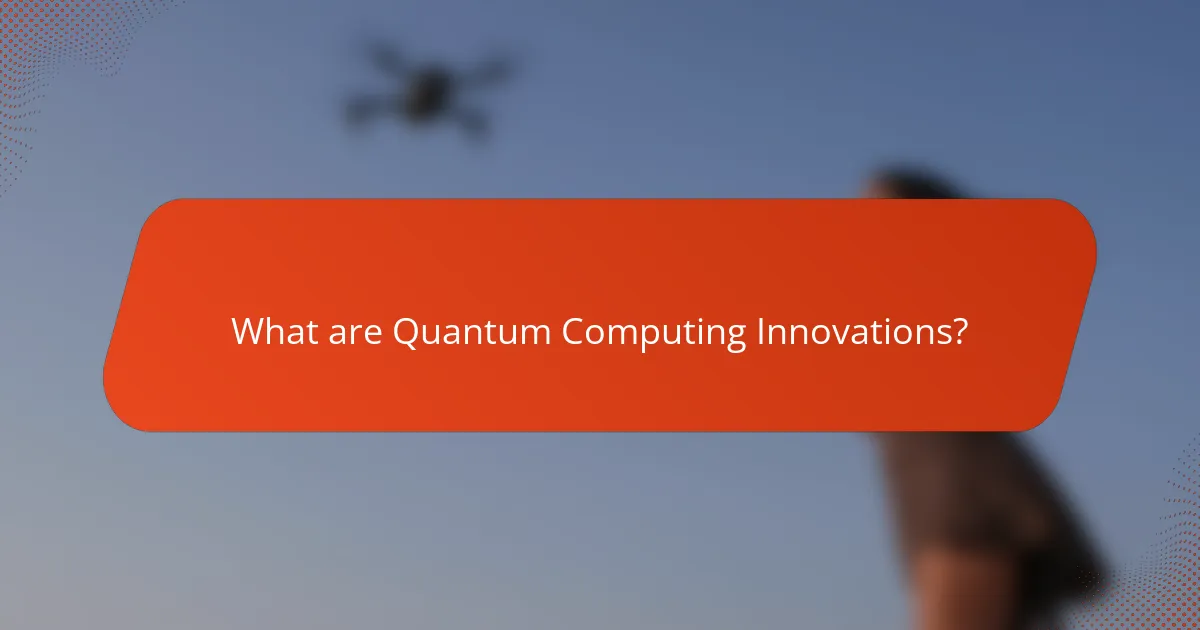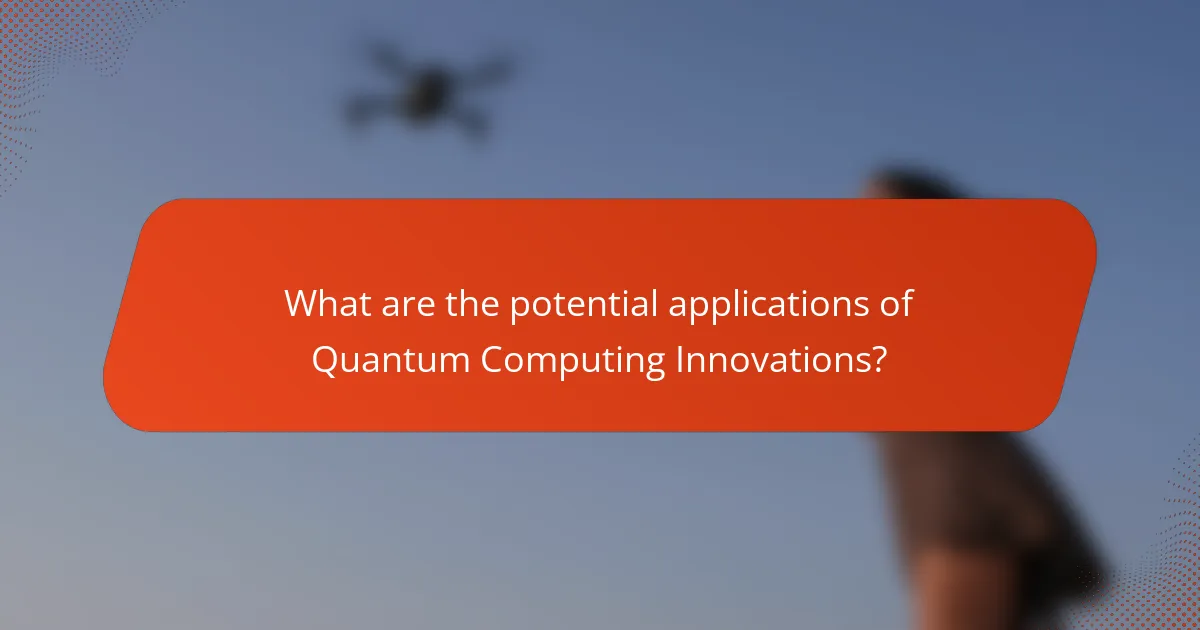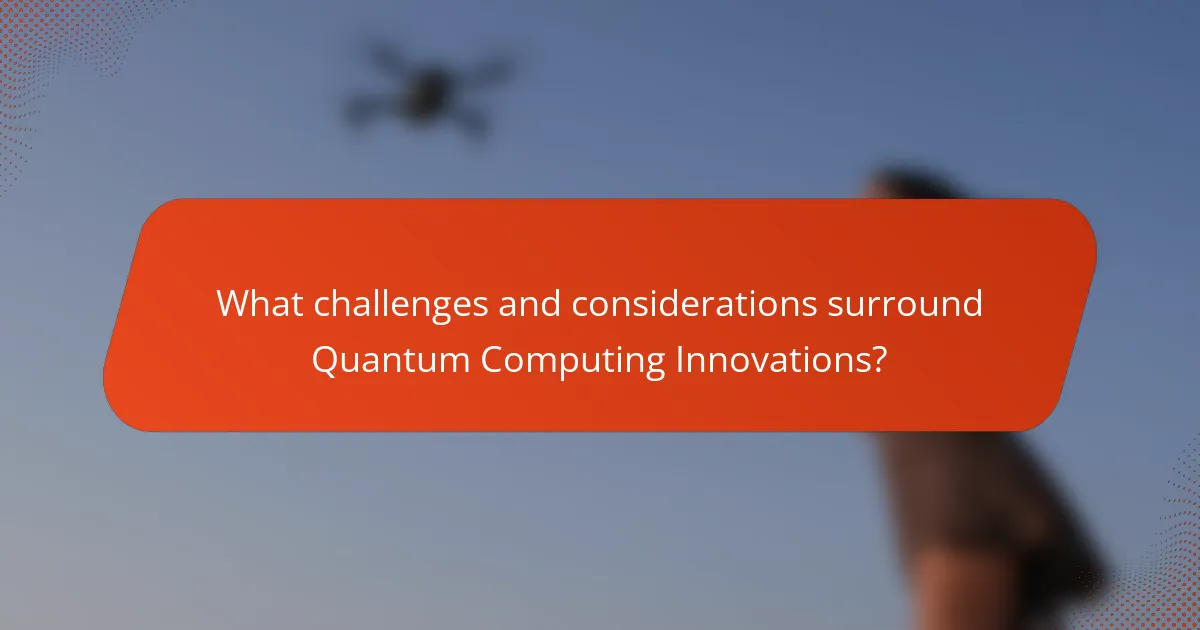Quantum computing innovations encompass advancements in quantum computation technology, including the development of quantum algorithms, hardware improvements, and error correction methods. Key algorithms such as Shor’s and Grover’s demonstrate significant advantages over classical computing, while enhancements in superconducting qubits and trapped ions improve computational capabilities. The potential applications of quantum computing span various fields, including cryptography, materials science, drug discovery, and finance, offering solutions to complex optimization problems and enabling faster data processing. However, challenges such as qubit error rates, the need for advanced algorithms, scalability issues, security concerns, and high development costs must be addressed to fully realize the benefits of quantum computing.

What are Quantum Computing Innovations?
Quantum computing innovations refer to advancements in the field of quantum computation technology. These innovations include the development of quantum algorithms, such as Shor’s and Grover’s algorithms, which significantly outperform classical counterparts. Quantum hardware improvements, like superconducting qubits and trapped ions, enhance computational power and stability. Quantum error correction methods have also progressed, allowing for more reliable computations. Research indicates that quantum computing can revolutionize fields like cryptography, materials science, and drug discovery. For instance, quantum simulations can model molecular interactions more accurately than classical methods, potentially leading to new pharmaceuticals.
How do Quantum Computing Innovations differ from classical computing?
Quantum computing innovations use quantum bits, or qubits, which can represent multiple states simultaneously. This contrasts with classical computing, which relies on binary bits that can only be in one state at a time. Qubits enable quantum superposition, allowing quantum computers to process vast amounts of data more efficiently. Additionally, quantum entanglement allows qubits to be interconnected, providing enhanced computational power and speed.
Classical computers perform calculations sequentially, which limits their processing capabilities. In contrast, quantum computers can execute multiple calculations at once due to their unique properties. Research indicates that quantum algorithms can solve certain problems exponentially faster than classical algorithms. For example, Shor’s algorithm can factor large numbers in polynomial time, whereas the best-known classical algorithms take exponential time.
These differences highlight the transformative potential of quantum computing innovations compared to classical computing.
What are the fundamental principles of quantum mechanics that enable these innovations?
The fundamental principles of quantum mechanics that enable innovations in quantum computing include superposition, entanglement, and quantum interference. Superposition allows quantum bits, or qubits, to exist in multiple states simultaneously. This property enables quantum computers to process vast amounts of data more efficiently than classical computers.
Entanglement is a phenomenon where qubits become interconnected, such that the state of one qubit can instantaneously affect another, regardless of distance. This principle facilitates faster communication and complex problem-solving capabilities.
Quantum interference is the ability of quantum states to combine in ways that amplify desired outcomes while canceling out undesired ones. This principle is crucial for optimizing algorithms used in quantum computing.
These principles collectively enhance the computational power and efficiency of quantum systems, leading to groundbreaking advancements in various fields such as cryptography and material science.
What advancements in technology have led to recent innovations in quantum computing?
Recent advancements in technology that have led to innovations in quantum computing include improvements in qubit stability and error correction techniques. Researchers have developed superconducting qubits that maintain coherence for longer periods. This enhances computational reliability. Additionally, advancements in quantum algorithms have optimized processing efficiency. Innovations in quantum hardware, such as ion trap technology, have also contributed to better qubit manipulation. Machine learning applications are being integrated into quantum systems, improving their functionality. Furthermore, developments in photonic quantum computing have enabled faster information transfer. These technological improvements collectively push the boundaries of quantum computing capabilities.
What are the key components of Quantum Computing Innovations?
The key components of Quantum Computing Innovations include quantum bits (qubits), quantum gates, and quantum algorithms. Qubits are the fundamental units of quantum information. They can exist in multiple states simultaneously due to superposition. Quantum gates manipulate qubits to perform calculations. These gates are the building blocks of quantum circuits. Quantum algorithms, such as Shor’s and Grover’s, provide efficient solutions to complex problems. They leverage quantum mechanics to outperform classical algorithms. These components collectively enable advancements in fields like cryptography and optimization.
What types of quantum bits (qubits) are used in quantum computers?
Superconducting qubits, trapped ion qubits, topological qubits, and photonic qubits are the main types of quantum bits used in quantum computers. Superconducting qubits utilize superconducting circuits to achieve quantum states. They are widely used by companies like IBM and Google. Trapped ion qubits use ions confined in electromagnetic fields. This method is known for high fidelity operations. Topological qubits are based on non-abelian anyons and are still largely theoretical. They promise increased resistance to decoherence. Photonic qubits use light particles to represent quantum information. They allow for robust quantum communication. Each type of qubit has unique advantages and challenges in quantum computing applications.
How do quantum gates function within quantum computing systems?
Quantum gates manipulate qubits in quantum computing systems. They serve as the fundamental building blocks for quantum circuits. Quantum gates perform operations such as rotation and entanglement. Each gate corresponds to a specific mathematical operation. For example, the Hadamard gate creates superposition. The CNOT gate entangles two qubits, establishing a relationship between them. Quantum gates operate on the principles of quantum mechanics. They utilize phenomena like superposition and entanglement to achieve computational advantages.

What are the potential applications of Quantum Computing Innovations?
Quantum computing innovations have several potential applications across various fields. They can significantly enhance optimization problems in logistics and supply chain management. Quantum algorithms can solve complex problems faster than classical computers. They are poised to revolutionize drug discovery by simulating molecular interactions accurately. In finance, quantum computing can improve risk analysis and portfolio optimization. Quantum machine learning can process large datasets more efficiently than traditional methods. Cryptography will benefit from quantum computing through more secure communication protocols. Lastly, quantum computing can advance artificial intelligence by enabling faster data processing and analysis.
How can Quantum Computing Innovations impact industries?
Quantum computing innovations can significantly impact industries by enhancing computational power and efficiency. These advancements enable faster problem-solving capabilities. Industries like pharmaceuticals can accelerate drug discovery processes. For example, quantum algorithms can simulate molecular interactions more accurately. In finance, quantum computing can optimize trading strategies and risk analysis. This technology can process large datasets rapidly, providing real-time insights. Additionally, supply chain management can benefit from improved logistics and inventory optimization. Quantum computing’s ability to handle complex calculations opens new possibilities across various sectors.
What role does quantum computing play in pharmaceuticals and drug discovery?
Quantum computing significantly enhances pharmaceuticals and drug discovery. It enables faster simulations of molecular interactions and complex biochemical processes. Traditional computing struggles with these calculations due to their scale and complexity. Quantum computers can process vast amounts of data simultaneously, leading to quicker insights. They can optimize drug design by predicting how different compounds will behave in the body. This capability reduces the time and cost associated with drug development. Research from the University of California, Berkeley, highlights that quantum algorithms can outperform classical methods in molecular modeling. Thus, quantum computing is poised to revolutionize the pharmaceutical industry by accelerating innovation and improving drug efficacy.
How might quantum computing transform financial modeling and risk analysis?
Quantum computing could significantly enhance financial modeling and risk analysis. It offers the ability to process vast amounts of data at unprecedented speeds. This capability allows for more complex simulations and optimizations. Traditional computing struggles with the intricacies of financial systems. Quantum algorithms can solve problems that are currently infeasible. For instance, they can improve portfolio optimization and risk assessment models. Research indicates that quantum computing can reduce computation time from years to minutes. A study by IBM highlights its potential in analyzing market behaviors and predicting outcomes. This transformation could lead to more accurate financial forecasts and risk evaluations.
What are some emerging use cases for Quantum Computing Innovations?
Emerging use cases for quantum computing innovations include drug discovery, optimization problems, and cryptography. Quantum computing can simulate molecular interactions, significantly speeding up the drug development process. For instance, companies like D-Wave are working on quantum algorithms that can analyze complex chemical reactions. In logistics, quantum computing optimizes supply chains by solving problems that classical computers struggle with. This can lead to cost reductions and improved efficiency for businesses. Additionally, quantum computing enhances cryptographic methods, providing stronger security through quantum key distribution. Research indicates that these applications could revolutionize industries by enabling solutions that were previously unattainable with classical computing.
How can quantum computing enhance machine learning and artificial intelligence?
Quantum computing can significantly enhance machine learning and artificial intelligence by processing vast amounts of data more efficiently than classical computers. Quantum algorithms can solve complex optimization problems faster. This speed allows for quicker training of machine learning models. Quantum computers utilize qubits, which can represent multiple states simultaneously. This capability improves the performance of algorithms like those used in neural networks. Research indicates that quantum-enhanced machine learning can achieve exponential speedups. For example, a study by Google demonstrated quantum advantage in specific tasks. Such advancements can lead to breakthroughs in AI applications across various fields.
What are the implications of quantum computing for cybersecurity and encryption?
Quantum computing poses significant implications for cybersecurity and encryption. It has the potential to break traditional encryption methods. For example, Shor’s algorithm can factor large integers efficiently. This capability threatens RSA encryption, widely used for secure data transmission. Quantum computers can also compromise symmetric encryption methods, though to a lesser extent. Grover’s algorithm can reduce the effective key length of symmetric ciphers. Current encryption protocols may become obsolete with the advancement of quantum technology. Consequently, there is a pressing need for quantum-resistant algorithms. Research is ongoing to develop cryptographic systems that can withstand quantum attacks.

What challenges and considerations surround Quantum Computing Innovations?
Quantum computing innovations face several challenges and considerations. One major challenge is error rates in quantum bits, or qubits. Current qubit technology, such as superconducting qubits, has high error rates due to decoherence. This limits the reliability of quantum computations.
Another consideration is the need for advanced algorithms. Classical algorithms cannot efficiently solve problems that quantum computers aim to address. Quantum algorithms, like Shor’s and Grover’s, are still in development. Their effectiveness and applicability require further research.
Scalability is also a significant challenge. Building large-scale quantum computers involves complex engineering and materials science. Current prototypes are limited in the number of qubits they can effectively manage.
Additionally, there are concerns regarding quantum security. Quantum computers could potentially break existing encryption methods. This raises questions about data privacy and cybersecurity in a quantum future.
Lastly, the cost of developing quantum technologies is substantial. Research and development require significant investment from both public and private sectors. This financial barrier can slow innovation and deployment.
What are the current limitations of Quantum Computing Innovations?
Current limitations of quantum computing innovations include issues related to qubit coherence, error rates, and scalability. Qubits, the fundamental units of quantum information, are prone to decoherence, which limits their operational time. High error rates in quantum gates hinder reliable computations. Additionally, existing quantum systems struggle to scale up to a practical number of qubits for complex calculations. The technology requires significant advancements in error correction methods to enhance performance. Current quantum computers are also expensive to build and maintain, limiting widespread access. These challenges impede the realization of quantum computing’s full potential in various applications.
How does error correction affect the reliability of quantum computations?
Error correction significantly enhances the reliability of quantum computations. Quantum systems are inherently susceptible to errors due to decoherence and noise. Implementing error correction codes mitigates these errors, allowing for more accurate results. For example, the surface code is a popular error correction method that can protect quantum information. It uses qubits arranged in a two-dimensional grid to detect and correct errors. Research shows that effective error correction can extend quantum coherence times, leading to more reliable computations. A study by Gottesman and Chuang (2001) demonstrates that error correction can improve the fidelity of quantum gates. Thus, error correction is crucial for achieving practical quantum computing.
What are the scalability challenges faced by quantum computing technologies?
Quantum computing technologies face several scalability challenges. One major challenge is maintaining qubit coherence over time. Qubits are highly susceptible to environmental noise, which can lead to errors in computations. Another challenge is the physical implementation of qubits. Current technologies, such as superconducting qubits and trapped ions, each have limitations in scalability.
Additionally, interconnecting a large number of qubits while minimizing error rates is complex. The error correction methods required for large-scale quantum computers also demand significant resources. Furthermore, developing efficient algorithms that can leverage large-scale quantum systems is still an ongoing research area. These challenges hinder the practical deployment of quantum computing at scale.
What ethical considerations arise from Quantum Computing Innovations?
Quantum computing innovations raise significant ethical considerations. These include data privacy concerns, as quantum computers can potentially break current encryption methods. The ability to decipher encrypted data poses risks to personal and corporate information security. Additionally, there are implications for fairness in technology access. Quantum computing may widen the gap between technologically advanced nations and those with limited resources.
Moreover, the potential for quantum computing to enhance artificial intelligence raises ethical questions about decision-making and accountability. As AI systems become more powerful, ensuring they operate within ethical boundaries is crucial. Lastly, there are environmental concerns. The energy consumption of quantum computers could have ecological impacts if not managed responsibly. These ethical considerations must be addressed to harness the benefits of quantum computing responsibly.
How might quantum computing influence data privacy and security standards?
Quantum computing may significantly impact data privacy and security standards. It has the potential to break traditional encryption methods. Current encryption relies on complex mathematical problems. Quantum computers can solve these problems much faster than classical computers. For instance, Shor’s algorithm can factor large integers efficiently. This capability threatens the security of widely used protocols like RSA. As quantum computing advances, existing data protection measures may become obsolete. Organizations will need to adopt quantum-resistant algorithms. The transition to new standards is critical to maintain data integrity and confidentiality.
What are the societal implications of widespread quantum computing adoption?
Widespread quantum computing adoption will significantly impact society by transforming industries and enhancing problem-solving capabilities. This technology enables faster data processing and more complex simulations than classical computers. Industries such as pharmaceuticals can accelerate drug discovery through improved molecular modeling. Financial services may benefit from more efficient risk analysis and portfolio optimization.
Moreover, quantum computing could revolutionize artificial intelligence by enabling more sophisticated algorithms. This advancement may lead to breakthroughs in machine learning and data analysis. However, the technology also raises concerns about cybersecurity. Quantum computers could potentially break current encryption methods, posing risks to data privacy and security.
Governments and organizations will need to adapt to these challenges by developing new security protocols. The societal implications of quantum computing are vast, influencing economic structures, job markets, and ethical considerations in technology use.
What practical steps can organizations take to leverage Quantum Computing Innovations?
Organizations can leverage Quantum Computing Innovations by investing in research and development. They should collaborate with academic institutions and tech companies specializing in quantum technologies. Establishing dedicated teams to explore quantum applications is crucial. Organizations must also invest in training their workforce on quantum computing principles. Implementing pilot projects can help test quantum solutions in real-world scenarios. Engaging in knowledge-sharing forums and conferences will enhance understanding of industry advancements. Additionally, securing partnerships with quantum hardware providers will ensure access to the latest technology. These steps can position organizations to benefit from the anticipated transformative impacts of quantum computing.
How can companies prepare for the integration of quantum computing into their operations?
Companies can prepare for the integration of quantum computing by developing a strategic roadmap. This roadmap should include assessing current capabilities and identifying potential use cases for quantum technology. Training employees in quantum computing fundamentals is essential. Collaborating with quantum technology providers can enhance understanding and access to resources. Establishing partnerships with academic institutions can foster innovation and research. Companies should also invest in pilot projects to test quantum solutions in real-world scenarios. Continuous evaluation and adaptation of strategies will ensure alignment with evolving quantum advancements. These steps are crucial as quantum computing is projected to revolutionize industries by solving complex problems faster than classical computers.
What resources are available for businesses looking to explore quantum computing solutions?
Businesses can access various resources to explore quantum computing solutions. These include online platforms like IBM Quantum Experience and Microsoft Quantum Development Kit. Both platforms offer tools for developing quantum algorithms. Additionally, organizations like the Quantum Economic Development Consortium provide networking and educational resources. Research institutions often publish papers detailing advancements in quantum technology. Conferences and workshops also focus on quantum computing applications and innovations. Industry collaborations can provide practical insights and shared resources.
Quantum Computing Innovations represent advancements in quantum computation technology, including the development of quantum algorithms, hardware improvements, and error correction methods. These innovations significantly differ from classical computing by utilizing quantum bits (qubits) that allow for superposition and entanglement, enhancing computational power and efficiency. The article explores the fundamental principles of quantum mechanics that enable these innovations, key components like qubits and quantum gates, and their potential applications across various fields such as pharmaceuticals, finance, and cybersecurity. Additionally, it addresses the challenges, limitations, and ethical considerations surrounding quantum computing, providing a comprehensive overview of its transformative impact on industries and society.




